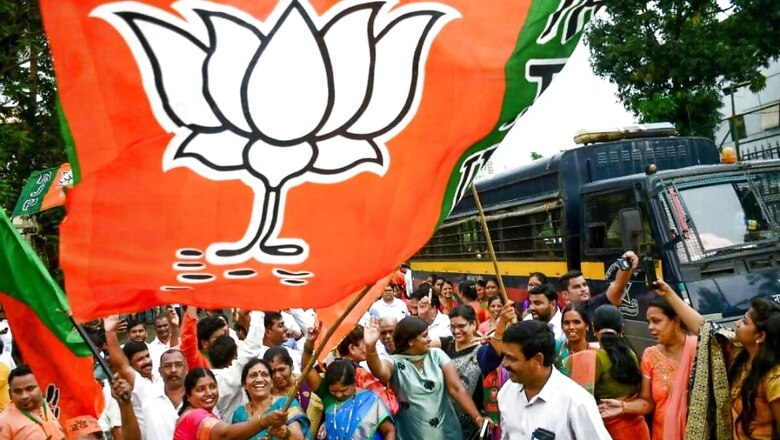
views
It’s ‘party time’ in Assam! The northeastern state that goes to polls in April-May 2021 is witnessing mushrooming of regional political parties — a trend, many fear, could end up helping the ruling Bharatiya Janata Party (BJP) if they fail to forge any alliance soon.
Days after the influential All Assam Students’ Union (AASU) and the Asom Jatiyatabadi Yuba Chatra Parishad (AJYCP) launched a political outfit, jailed activist Akhil Gogoi’s Krishak Mukti Sangram Samiti (KMSS) has also announced its decision to float a party. The latter is upset at not being included in the AASU-led party – the Assam Jatiya Parishad (AJP).
Earlier, in July, former BJP leader Pradyut Bora launched the Liberal Democratic Party (LDP) with the aim of fighting the “Congress’s corruption and BJP’s deception”. Around the same time, journalist-turned-Rajya Sabha member Ajit Bhuyan took the lead in forming a political forum of indigenous organisations to take on the BJP in the upcoming polls.
The need for a regional alternative to the BJP and the Congress was strongly felt in the wake of the massive agitation against the controversial Citizenship Amendment Act (CAA) in the state last December. Since then, the civil society had been pushing for a political outfit comprising the anti-CAA organisations, including the AASU, the AJYCP, the KMSS among others.
However, instead of joining forces, these groups are seen criticising each other in public, much to the delight of the BJP. In one episode, the LDP had even threatened the AJP with a Rs 10-crore defamation suit over a membership row.
AGP – AASU’s Achilles heel
This is not the first time that AASU is taking the plunge into politics. The student body had spearheaded the six-year Assam Agitation against the influx of illegal immigrants from Bangladesh, leading to the signing of the Assam Accord in 1985. The same year, AASU-backed regional party – the Asom Gana Parishad (AGP) – was born which formed what was seen as India’s youngest cabinet, destroying the Congress’s hegemony in the state.
However, the AGP proved to be AASU’s Achilles heel in no time. The initial euphoria of regional politics started fading when the AGP government failed to fulfil key promises, including the implementation of the Assam Accord. The two stints of the AGP government – 1985-1991 and 1996-2001 – became synonymous with nepotism, corruption and misgovernance. Towards the end of its second term, the AGP was accused of unleashing a reign of terror in the state. It was during this period when the infamous “secret killings” or extrajudicial killings of innocent people – mainly friends and family members of the United Liberation Front of Asom (ULFA) cadres – were carried out, allegedly by the state government.
Since then, the AGP has been in a downward spiral that had helped BJP make inroads and expand its base not only in Assam but also the rest of the Northeast. The AGP was seen as the biggest betrayer when its lone Rajya Sabha member Birendra Prasad Baishya voted in favour of the citizenship bill (now CAA) last year. The legislation is viewed as violative of the Assam Accord following fears that it would encourage more migration, thereby posing a threat to the state’s ethnic demography.
AASU that once gave birth to the AGP is now busy making strategies to oust the party and its ally BJP.
Winning trust of tribals
The newly floated AJP would do well to create space for tribal leaders in its rank and file in order to avoid past mistakes. Needless to say, AASU’s overemphasis on the “Assamese identity” in the 1980s had created a sense of alienation among the tribals, especially the Bodos, the largest ethnolinguistic group in Assam. It was the failure of the AASU-AGP combine to understand the sentiments of the community that sowed the seeds of the Bodo movement and tribal insurgency, which eventually led to the creation of an autonomous region under the Sixth Schedule of the Constitution.
It will be quite challenging for the AJP to win trust of not only the Bodos, but also other prominent tribes such as Karbi, Dimasa, Rabha and Mising if it does not spell out a clear roadmap for overall development of these ethnic groups. There are already indications that the All Assam Tribal Sangha and the Co-ordination Committee of the Tribal Organisations of Assam (CCTOA) are preparing the ground for a political unity among the tribal bodies ahead of the 2021 polls.
Tribals are a decisive factor in 60 out of 126 assembly seats in the state. Considering that the BJP already has a strong base in tribal pockets, and the Sixth Schedule areas are out of the CAA’s purview, the AJP must devise a completely different game plan to win the support of these communities. Perhaps, it’s high time the AJP made amends for AASU’s past mistakes and started talking about the multi-ethnic dimension of the Assamese culture and indigeneity instead of harping on the narrow definition of the Assamese people.
(The author is a senior journalist and writer based in Delhi. Views expressed are personal.)




















Comments
0 comment